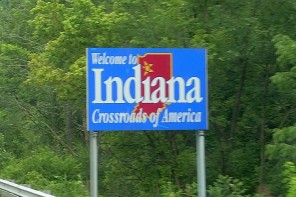While I’m not sure if Fox News has a “War on Easter” yet, or concerned stories about Black Easter Bunnies, but there’s got to be one in the works. After all, why should faux Christian outrage and exaggerated persecution be relegated just to Christmas, right?
For most of us, Easter is a time where we celebrate Jesus — and his 12 delectable Peep apostles — and His resurrection into an adorable bunny. And like with Thanksgiving, there’s a lot of food consumption and awkward conversations with hated family members that comes with Easter. But while many Christians (well, “Holiday Christians”) celebrate Easter as a biblical tradition dating back to Jesus’ resurrection, Christians are unwittingly partaking in what are actually ancient traditions rooted in pagan mystery religions, all of which happened thousands of years before Christ.
Look, the “Ten Commandments” movie was an awesome film, and attending Easter mass to satisfy a religious parent certainly won’t upset the tree gods, but it’s important to know what Christians are really celebrating.
Here’s the Amazing Historical Origin of Easter, via Philip Neal of cbcg.org:
It comes as a surprise to many to learn that the only place in the King James Version of the Bible that even mentions ‘Easter’—Acts 12:4—is a gross mistranslation. Here, the Greek word Pascha (translated Easter) always means ‘Passover.’ The widely acknowledged error has been corrected in all modern translations. Referring to the passage, Barnes’ Notes comments that there ‘was never a more absurd … translation than this.’
So, if there is no biblical basis for Easter, where and how did it originate?
Astonishingly, Easter has its roots in ancient, polytheistic pagan religions. Countless scholarly books and reference materials document the historical development of Easter—clearly demonstrating that it is fully pagan in origin.
In Come Out of Her My People, Dr. C. J. Koster, writes: ‘The whole subject of Easter, its Sunday-emphasizing date, and its pagan emblems and rites, such as Easter sunrise services, is crowned by the general admission that the word “Easter” is derived from the name of a goddess, the dawn-goddess, the spring-deity, the goddess of fertility.
‘Easter had a pre-Christian origin, namely [involving] a festival [held] in honor of Eostre, the Teutonic dawn-goddess…. This Eostre was also known to be the spring goddess of fertility. [As] another form of sun-worship … Eostre, also called Eastre, Eostra or Ostara, was adopted by or merged with Christianity. This same dawn-goddess was also well known … [as] the Assyrian Ishtar, goddess of the morning’ (emphasis added).
In the ancient Middle East, people were deeply connected to the land and to the naturally-occurring agricultural cycle. The land’s fertility was the key to survival. The spring of the year was highly anticipated—when productivity and fertility returned after a long desolate winter. Many cultures celebrated the coming of spring as an integral part of the worship of their gods or goddesses, particularly those associated with fertility. Koster adds that eggs and rabbits were common symbols of fertility, and that the Easter goddess was “not only goddess of dawn but also goddess of spring with all its fertility symbols and fertility rites.’
Click here to read more about this wonderfully misunderstood holiday. Oh, and grab a basket of Cadbury cream eggs, as it might take a while.
H/T: Philip Neal of cbcg.org|Featured image courtesy of TheNervousBreakdown.com
 Michael is a comedian/VO artist/Columnist extraordinaire. Follow him on Twitter and Facebook
Michael is a comedian/VO artist/Columnist extraordinaire. Follow him on Twitter and Facebook
 Send to Kindle
Send to Kindle










Pingback: Happy Holidays! | Sagittarius Dolly()